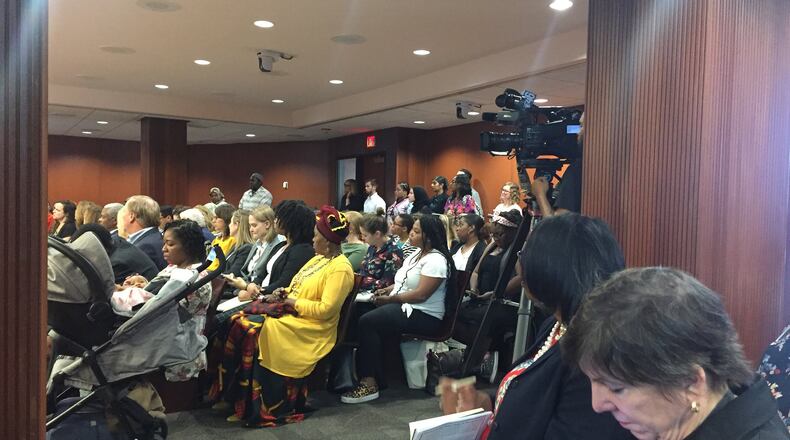Georgia has a maternal mortality crisis. State officials are struggling to understand it.
More Georgians die in the time before, during and after childbirth than women in most other states and even many developing countries. And the U.S. has the worst rates among developed nations.
For deaths that are definitely related to pregnancy, about 26 women died for every 100,000 live births in Georgia, according to a recent report on 2014 data.
But the data is sketchy, and even those facts came into dispute during the inaugural meeting of a legislative panel set up to attack the problem.
"We still have a lot of work to do," said state Rep. Sharon Cooper, R-Marietta, a co-chairwoman of the panel.
READ MORE:Georgia maternal death rate, once ranked worst in U.S., worse now
The state House on Thursday launched its most focused effort ever to grapple with maternal mortality, with the hope of coming up with legislation or solutions to address it. It formed a study committee, which called state experts to explain what they know and don’t know, and what is being accomplished so far.
One key fact is that African American women are three times more likely to die from pregancy-related causes.
The panel leaders said they needed to get the data right so they can understand the problem correctly and find data-driven solutions that will work. That is a challenge.
Start with just knowing how many women’s deaths were “associated” with pregnancy — deaths that simply happened before, during or after birth. The legal way to report a maternal death is to fill out an official state form and send it in. Officials believe that actually happens maybe 2% to 3% of the time.
So state officials attacked the question another way by getting a checkbox approved for death certificates. That has its own problems.
It simply asks whether a person was pregnant within the past year. Mistakes were legion. One way officials knew there were mistakes is the box kept being checked for men. So the state hardwired the computer system to prevent that.
Now, they still get false positives. For example, the doctors, coroners and medical examiners who are allowed to fill out death certificates sometimes check the box for a girl under age 10 or woman over 55. Those are simply removed by the officials reviewing the data.
The data officials say that conversely, they don’t know how many boxes should have been checked but aren’t. So the numbers available now may well be too low.
During the meeting, some panel members complained that of the two data sets available, the numbers that made the news were too high. The “pregnancy-associated” deaths can have anyone in them, even someone who died in a car crash, under the theory that it may point the way to unknown problems worth investigating in the future, such as strokes during car crashes or suicides by car crash.
The legislators cited the work of a group of doctors and public health staff that go through the “pregnancy-associated” deaths — anyone who died before, during or after giving birth — and cull out the smaller number of those that were definitely related to the pregnancy. Those “pregancy-related” deaths in Georgia numbered 101 in the last year reported and were preventable more than half the time.
The benches were packed with listeners at Thursday’s meeting. There were new moms, women who saw maternal illness in their own community, activists and even a German television crew.
Many of them said they were concerned that the panel’s focus for the two hours on data was the wrong tack or showed a lack of concern for the real problems. Experts say a step that may move the needle the most on maternal mortality is meeting basic social needs and establishing access to regular health care before there’s a crisis.
“I just think they’re so out of touch,” said Shawntel White of Rex. She brought her 17-week-old baby with her to listen.
“They have a lot of emphasis on adding more to the data,” White said. “But what they weren’t focusing on was going into the community and listening to the women of color who are most affected. I think they could learn what’s really happening. They can learn how it can be prevented.”
During the discussion on whether Georgia really ranked so low, audience members grumbled and a committee member bridled.
"In any event, regardless of the best or most favorable number for Georgia or the worst for Georgia, for women of color it's still a crisis, is that right?" said state Rep. Carolyn Hugley, D-Columbus.
Both Cooper and state Rep. Mark Newton, the panel's co-chairman, said that wasn't in question.
“In no way am I trying to deny that or not emphasize that. It is a major problem that we have,” Cooper said. “I just believe we need to work from good data. When we have correct data we know that’s an area that needs more attention and concern.”
Stay on top of what’s happening in Georgia government and politics at www.ajc.com/politics.
About the Author



